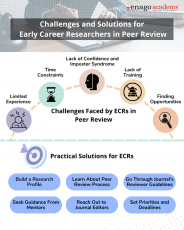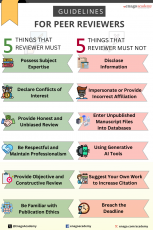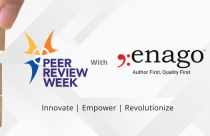Nurturing Peer Review Excellence: The significance of early career researchers (ECRs)

Recently, I came across a tweet posted by my colleague expressing his frustration as his paper was rejected after 3 months of submission due to the lack of reviewers for its peer review. Getting your paper ready for submission in itself is a challenging process; we sift through mountains of data, analyze it until our brain hurts, and write until our fingers cramp. Imagine you do all that, submit your paper to your dream journal, and then get a rejection due to lack of reviewers.
The academic publishing world, with its ever-expanding sea of knowledge, faces a growing predicament — a dearth of reviewers. As the volume of research articles surges, the availability of experts to rigorously assess these submissions struggles to keep pace. Compounding this challenge is the traditional practice of inviting reviewers from a well-worn pool. While convenient, this approach unintentionally perpetuates a cycle that lacks the essential ingredients of fresh perspectives, varied insights, and an efficient review process.
However, amidst these challenges lies a beacon of hope — the active participation of Early Career Researchers (ECRs). These emerging scholars bring fresh perspectives, innovative ideas, and evolving expertise to the peer review process. Their engagement not only addresses the pressing issue of reviewer shortages but also paves the way for a more inclusive, efficient, and effective future for peer review. In this article, we embark on a journey to explore the profound significance of ECRs in the peer review landscape. We delve into the challenges they encounter as they engage in peer review and provide practical solutions to empower them in this critical role.
Why Early Career Researchers Make Excellent Reviewers
Studies suggest that only around one-fifth of researchers contribute up to 94% of reviews. As research fields continued to grow and evolve, the literature has exploded and there are more papers now than a handful of people can handle. And the pandemic has made this situation worse with snowballing of preprints awaiting reviews. Early career researchers (ECRs) — PhD students, post-docs and recently-appointed principal investigators — constitute a large fraction of the scientific community. There are many reasons why they can make excellent peer reviewers. Here’s why:
- Fresh and Current Insights: ECRs often offer fresh viewpoints and up-to-date knowledge within their fields of expertise. They are at the forefront of these advancements, possessing up-to-date knowledge and innovative thinking. Their familiarity with cutting-edge technologies and methodologies can lead to the identification of potential biases or limitations that might be overlooked by more established reviewers.
- Critical Thinking: Peer reviewing cultivates critical thinking, a skill that ECRs can develop early in their careers. It hones analytical skills and the ability to provide constructive feedback.
- Networking: Engaging in peer review expands ECRs’ networks, enabling them to connect with other researchers in their field. This exposure fosters collaboration and keeps them informed about ongoing research.
- Equitable Representation and Diversity: Diversity in peer review is crucial for maintaining a balanced and unbiased evaluation process. ECRs from underrepresented groups can provide perspectives that reflect a broader range of experiences and backgrounds. Their involvement can help counteract unconscious biases and create a more inclusive peer review ecosystem that fosters diverse voices.
- Professional Growth: Serving as a peer reviewer demonstrates a commitment to their profession and can enhance their CV or resume. It signifies active engagement in their field’s advancement. Being acknowledged as a peer reviewer by reputable journals and publishers enhances an ECR’s professional credibility. This recognition can be particularly beneficial when applying for grants, academic positions, or collaborations.
- Fostering a Supportive Community: Involvement in the peer review process can help ECRs understand that peer review is not just about critique, but also about constructive feedback and collaboration. This firsthand experience can lead to a more empathetic and supportive research community, where researchers at all career stages contribute to each other’s growth.
The future of peer review depends on its ability to adapt and evolve in a rapidly changing research landscape. The active participation of early career researchers injects vitality, diversity, and innovation into the process, paving the way for a more robust and effective evaluation mechanism. By valuing the contributions of ECRs, the scientific community can collaboratively shape the future of peer review into a dynamic and inclusive process that upholds the integrity and advancement of research.
Challenges Faced by Early Career Researchers in Peer Review
My first few peer reviews were truly intimidating and definitely not easy. Not only did I question the manuscript I was reviewing, I questioned myself. While ECRs have much to offer as reviewers, they often face hurdles, such as imposter syndrome and a lack of confidence. Here are some key challenges ECRs face in their journey as peer reviewers:

- Limited Experience: One of the most significant challenges faced by ECRs is their limited experience in both research and peer review. Unlike seasoned researchers, ECRs might not have had exposure to a wide range of research papers and diverse methodologies. This inexperience can make it daunting to evaluate the quality of research effectively.
- Time Constraints: ECRs often have heavy workloads, including conducting their research, fulfilling teaching duties, and meeting academic deadlines. Finding the time to thoroughly review manuscripts can be a significant challenge. Balancing peer review responsibilities with other academic commitments can be demanding.
- Lack of Confidence and Imposter Syndrome: Many ECRs struggle with imposter syndrome, which can be worsened when they are asked to assess the work of more established researchers. They may question whether they possess the necessary expertise to provide a meaningful review, leading to self-doubt and hesitation.
- Lack of Training: Formal peer review training is often lacking in academic programs. ECRs may not receive guidance on how to conduct peer reviews, what to focus on, or how to provide constructive feedback. This lack of training can hinder their effectiveness as reviewers.
- Finding Opportunities: Getting started as a peer reviewer can be challenging for ECRs. They may not be aware of how to express their interest, reach out to journal editors, or establish themselves as potential reviewers. Overcoming the initial hurdle of finding opportunities can be daunting.
Solutions for Early Career Researchers in Peer Review
It is quite normal for ECRs to face these challenges when they step into the role of peer reviewers for the first time. However, they can be overcome with the right strategies and support systems in place. First and foremost, support from supervisors, colleagues, and training programs is essential. Training webinars and workshops, often offered by esteemed publishers, can build confidence and help ECRs understand the peer review process better.
Getting Started as a Peer Reviewer
ECRs can start their journey as peer reviewers by:
- Building a Research Profile: Establish yourself as an expert in your field by publishing and promoting your research.
- Learning About Peer Review: One of the most effective solutions is to provide ECRs with formal training in peer review. Explore available resources and take courses to familiarize yourself with the peer review process. Academic institutions, research organizations, and journals can offer workshops, webinars, and online courses specifically designed to teach the principles and best practices of peer review. The course on Peer Review Process provided by Enago Learn is one such example which focuses on the different models followed for peer review, journal decisions, effective feedback, ethical policies of peer review process, and more.
- Reaching Out: Contact relevant journal editors directly, express your interest, and demonstrate how your contributions can add value to the process. Furthermore, you can also register yourself for the ‘Volunteer to Review’ initiative launched by several journals.
Balancing Peer Review with Other Commitments
Peer reviewing can be time-consuming, and ECRs must find a balance between reviewing and their other academic responsibilities. Prioritization, realistic time management, and providing specific, constructive feedback can help manage the workload effectively. ECRs can prioritize peer review activities by allocating specific time slots in their schedules. When you receive a peer review invitation, assess your workload realistically. If the deadline aligns with a busy period in your academic calendar, don’t hesitate to negotiate an extension with the journal editor. Many editors are willing to accommodate reasonable requests.
Leverage digital tools and technology to streamline your work. Utilize calendar apps and project management software to keep track of deadlines and tasks. Reference management tools can help you organize research materials efficiently. You can also explore Enago Read, an AI-powered review assistant which can accelerate the peer review process by simplifying the literature search strategies and assist in generating high-quality review reports.
Here’s a visual guide to the essential guidelines for peer reviewers, highlighting the must-dos and the crucial must-nots:

Conclusion: Paving the Way Towards a Brighter Peer Review Future
The future of peer review is a dynamic one, where collaboration knows no bounds, diversity is celebrated, and innovation knows no limits. ECRs, as the torchbearers of progress, have a tremendous opportunity and responsibility. They are not just contributors to the process; they are architects of its future. The challenges are real, but so are the solutions. With mentorship, training, and support, ECRs can confidently step into their roles as peer reviewers, enriching the scholarly world for generations to come. Together, we can illuminate the path toward a more vibrant, inclusive, and impactful future for peer review and academia as a whole. So, have you had experiences as an ECR in peer review, either as a reviewer or an author? What challenges did you face, and how did you overcome them? Share your thoughts, stories, and suggestions in the comments section below, or write an article to Enago Academy’s Open Platform. Your voice matters!
Frequently Asked Questions
Being a peer reviewer as an early career researcher comes with several significant benefits:
i. Skill Development: Peer reviewing enhances critical thinking, analytical, and communication skills. ii. Network Expansion: Connect with experts in your field and gain visibility.
iii. Contribution: Shape the quality of scholarly work and contribute to research advancement. iv. CV Enhancement: Showcase your commitment to your field on your CV or resume.
Becoming a peer reviewer involves several steps. Firstly, build expertise in your research area to establish credibility. Publishing papers in reputable journals helps demonstrate your knowledge and qualifications. Networking is crucial; connect with journal editors and express your interest in becoming a reviewer. Consider taking peer review training courses to enhance your skills. It's often best to start small, accepting invitations from familiar journals to gain experience. Over time, your reputation as a reliable and knowledgeable reviewer will grow, opening doors to more extensive peer review opportunities. Check out this FREE webinar for detailed insights: https://www.enago.com/academy/how-to-become-a-peer-reviewer-doing-your-share-for-the-research-community/
Peer Review Skills for Early Career Researchers:
i. Critical Analysis: The ability to evaluate research rigorously ii. Effective Communication: Clear and constructive feedback
iii. Time Management: Meeting review deadlines promptly iv. Ethical Awareness: Identifying ethical issues and misconduct
v. Adaptability: Willingness to learn and adapt to different research fields vi. Confidentiality: Maintaining the confidentiality of the review process
vii. Professionalism: Interacting respectfully with authors and editors









